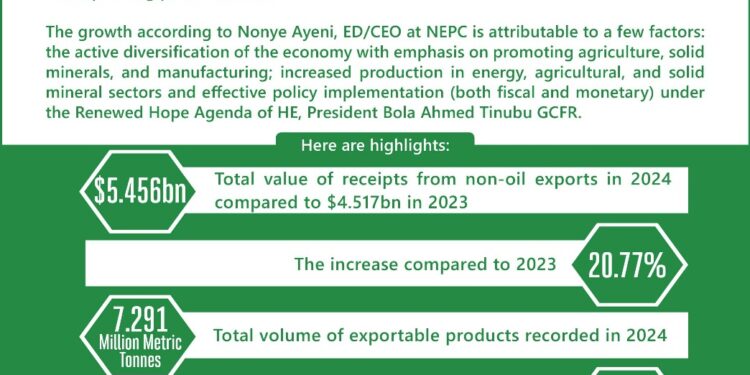Nigeria’s non-oil exports reached $5.46 billion in 2024, marking a 20.77% increase. The NEPC credits successful policies, programmes, and global demand
The Nigerian Export Promotion Council (NEPC) has released its impressive performance report for 2024, showing significant growth in the country’s non-oil export sector.
Also read: Increased Crude Oil production: NCDMB Advocates Annual FID Week
According to Nonye Ayeni, the Executive Director/CEO of NEPC, Nigeria’s non-oil exports reached $5.456 billion in 2024, reflecting a 20.77% increase compared to 2023’s $4.517 billion.

This achievement highlights the effectiveness of NEPC’s initiatives and the broader push for economic diversification under President Bola Ahmed Tinubu’s “Renewed Hope Agenda.”
Ayeni pointed out that the 2024 results were driven by various NEPC policies, including the “Go Global, Go for Certification” campaign, aimed at improving the quality of Made-in-Nigeria products.
The council also focused on expanding production capacity through programmes like the “Export 35 Redefined” and the “#doubleyourexport” initiative, which seek to empower farmers and processors to increase their export volumes.
The council exported a total of 7.291 million metric tonnes of products in 2024, up from 6.685 million metric tonnes in 2023.
The export basket for 2024 included 246 products, with top exports such as cocoa beans, urea, sesame seeds, cashew nuts, aluminum ingots, and cocoa butter.
Notably, cocoa butter saw a significant increase in exports, driven by rising global demand, improved production processes, and enhanced market access to key importing countries.
In terms of export receipts, the top exporters for 2024 were Indorama Eleme Fertilizer & Chemical Limited and Starlink Global & Ideal Limited, both of which made substantial contributions to the overall export growth.
Zenith Bank, First Bank, and Fidelity Bank also played key roles, supporting Nigerian exporters through financial transactions that accounted for a significant portion of total receipts.
The NEPC also noted that the bulk of Nigeria’s exports originated from the South West and South South regions, which together contributed 90% of the total exports in 2024.
The top export destinations for Nigerian products included the Netherlands, Brazil, and Malaysia, with Ghana continuing to lead as the primary intra-African trade partner.
One of the most notable developments in 2024 was the Central Bank of Nigeria’s approval for the inclusion of CFA in NXP forms for the repatriation of export proceeds.
This move is expected to benefit the NEPC’s “#doubleyourexport” initiative, as it facilitates smoother transactions for Nigerian exporters.
The NEPC’s efforts to boost Nigeria’s global competitiveness were further underscored by the certification of 400 SME exporters under the “Go Global, Go for Certification” campaign.
With a goal of certifying 855 businesses between 2022 and 2025, the NEPC is working to ensure that Nigerian exporters meet international standards and are well-equipped for global trade.
Another milestone was the launch of the Export Skills Acquisition Centre (ESAC) in Apapa, Lagos, a collaborative effort between the NEPC and Lelook Bag Academy.
The centre aims to bridge knowledge gaps and equip Nigerian exporters with the necessary skills to compete in the global marketplace.
The NEPC’s commitment to inclusivity was evident in its focus on empowering women-led businesses. In 2024, 587 women-led businesses benefited from the council’s programmes, while over 12,000 women, youth, and people with special needs participated in MSME clinics, Women in Export programmes, and Youth for Export Development Programmes (YEXDEP).
Looking ahead, the NEPC has already set its sights on continued growth in 2025, with key initiatives already in motion.
In February 2024, the World Trade Organisation (WTO) recognised the NEPC as one of four outstanding Business Support Organizations (BSOs) selected to implement the Women Exporters in the Digital Economy (WEIDE) Fund, a transformative initiative to support women entrepreneurs in international trade and digitalization.
As part of its ongoing efforts to ensure the quality of Nigerian exports, the NEPC is also working on the STDF 845 project for cowpea and sesame, which aims to reduce rejections of Nigerian exports by meeting international sanitary and phytosanitary standards.
With a projected global market value of $7.67 billion for sesame and $7.60 billion for cowpeas by 2025, the NEPC’s work in this area could significantly boost Nigeria’s export receipts.
With a strong track record in 2024 and clear plans for the future, the NEPC is well-positioned to continue driving growth in Nigeria’s non-oil export sector.
As the council continues to measure and evaluate its progress, it remains focused on improving the country’s global competitiveness and achieving its ambitious export targets for the years to come.









